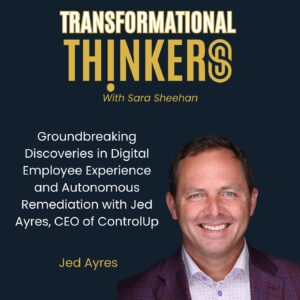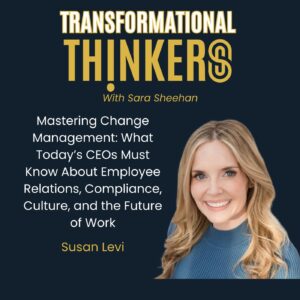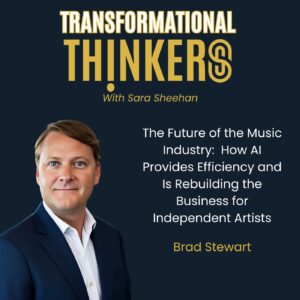Sara Sheehan’s guest in this episode is Alan Lazaros, Business Coach, Consultant, Trainer, and CEO of Next Level University. Alan’s approach to coaching comes from the heart, from lessons he learned through his personal life experiences, and has become an honest approach to inspiring, motivating, and educating people on what it truly takes to get to the next level in their lives and ambitions. Alan shares his story and thoughts on transformational thinking with Sara.
The revelations that came to Alan through losing his father to a fatal car accident and then surviving a terrible car accident himself brought him to the realization of his purpose; to assist people in re-tooling and reinventing themselves to achieve a greater level of success in their futures. He learned a lot about leadership through founding his business and guiding his team, and those internal lessons also enriched his coaching. He shares one of his most important principles, which is to ensure that a client’s goals are in alignment with who they really are.
Sara Sheehan and Alan Lazaros discuss Alan’s identified path to success and why self-awareness is what dictates how people will spend the three resources allotted to everyone in the human condition: time, effort, and money. Alan breaks down how our perceptions of ourselves and what we do dictate, to a large extent, who and what we become, and that it’s through habits and measurements of our progress that we achieve success. Sara learns more about Alan’s current work, his future business goals, and what he’s in the process of creating to achieve those goals. This conversation will inspire and transform the way we think about our ambitions.
About Alan Lazaros:
With a powerful combination of technical expertise and business acumen, Alan is a Business Coach, Consultant, Trainer, and Speaker specializing in helping businesses maximize their growth, impact, and profitability online. He believes in a heart-driven but NO BS approach to inspiring, motivating & educating others on what it REALLY takes to get to the next level.
At age 2, Alan’s father passed away in a car accident. At age 26, after getting into a nearly fatal car accident himself, he questioned everything he was doing in life. He questioned who he was and the choices he was making. He was at an all-time low.
Filled with regret, Alan searched for answers and found two of the brightest lights he had ever seen. The first bright light was a book by Bronnie Ware entitled, “The Top 5 Regrets of the Dying,” and the second was a Ted Talk by Tony Robbins. Both of these resources helped Alan find his way and guided him to make the choice of going ALL IN on self-improvement to design a life of meaning and purpose. On this self-improvement journey, Alan has learned he believes in a heart-driven but NO BS approach to inspiring, motivating, and educating others on what it REALLY takes to get to the Next Level.
Today, Alan is proud to say it is his mission to help others create a life full of both success and fulfillment. He learned the hard way how empty success without fulfillment is and how limiting fulfillment without success is as well. Today, he leads a global team of 21 people, and he’s quickly approaching his 10,000 hours of speaking, podcasting, training, and coaching individuals from all walks of life.
—
Resources discussed in this episode:
- “Emotional Intelligence 2.0” by Travis Bradberry and Jean Greaves
- “Atomic Habits” by James Clear
- “Measure What Matters” by John Doerr
__
Contact Sara Sheehan | Sara Sheehan Consulting:
Contact Alan Lazaros:
- Website: NextLevelUniverse.com
- Email: Alan@NextLevelUniverse.com
- Podcast: Next Level University
Hosted by Simplecast, an AdsWizz company. See pcm.adswizz.com for information about our collection and use of personal data for advertising.


